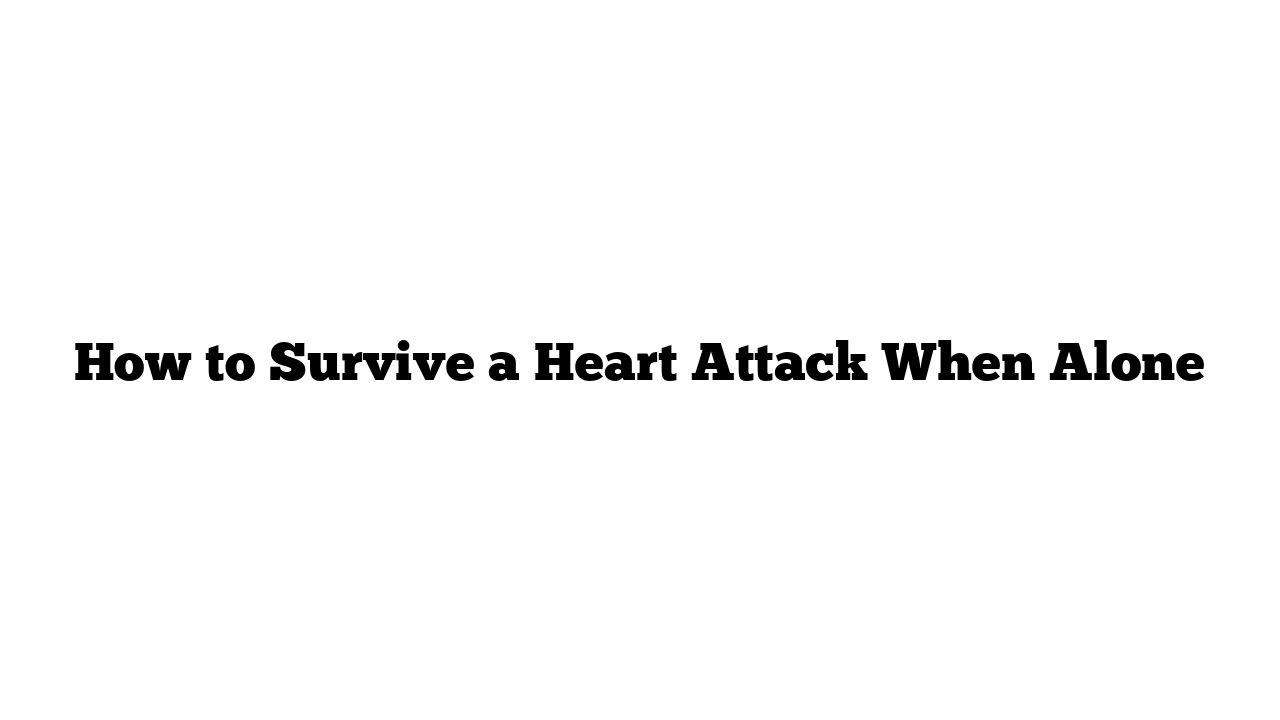Heart attacks can strike unexpectedly, whether you’re at work, in your car, or even home alone. According to the CDC, over 805,000 heart attacks occur yearly in the USA, with no guarantee someone will be nearby to help.
This guide provides practical steps you can take to increase your chances of survival when faced with a heart attack while alone.
What is a Heart Attack?
A heart attack, medically called a myocardial infarction, happens when blood flow to the heart is blocked, usually by a clot in a coronary artery. Without oxygen-rich blood, the heart muscle begins to die.
The American Heart Association reports that one in five deaths in the United States is linked to heart disease. Recognizing the symptoms early and acting fast can mean the difference between life and death.
Recognize the Symptoms Immediately
The first step to survival is knowing the warning signs. While chest pain is the most common symptom, heart attacks can present differently in some individuals.
Classic symptoms include:
- Chest pain or tightness lasting more than a few minutes, possibly spreading to the left arm, neck, jaw, back, or stomach.
- Shortness of breath, even at rest.
- Cold sweats, clammy skin, or feeling faint.
- Nausea, vomiting, or dizziness.
- A sense of impending doom or unexplained anxiety.
Pro tip: Don’t ignore mild symptoms. If something feels off, trust your instincts.
Steps to Take if You’re Alone
1. Call Emergency Services Immediately
Your phone is your lifeline. Call 911 immediately and clearly state that you suspect a heart attack. Provide your address or location. Use speakerphone to keep your hands free and follow the dispatcher’s instructions.
Important: Do not attempt to drive yourself to the hospital—you could lose consciousness, endangering yourself and others.
2. Sit or Lie Down in a Comfortable Position
Reduce strain on your heart by sitting or lying down. Elevate your head and upper body slightly with pillows or by leaning against a wall. This position helps you breathe more easily.
3. Take Aspirin if Available
Aspirin acts as a blood thinner, potentially reducing clot size. Chew a 300 mg aspirin tablet (if you’re not allergic and have been advised to do so by a doctor).
Tip: Always have aspirin easily accessible in case of emergencies.
4. Control Your Breathing and Stay Calm
Panic can worsen the situation by increasing heart rate and blood pressure. Practice slow, deep breathing:
- Inhale through your nose for a count of three.
- Exhale slowly through your mouth.
This technique helps conserve oxygen and reduces strain on your heart.
5. Avoid Unnecessary Movement
Stay as still as possible. Avoid climbing stairs, reaching for objects, or making sudden movements that could stress your heart. Conserve your energy while waiting for help.
6. Loosen Tight Clothing
Remove or loosen ties, belts, bras, or anything restricting your breathing or circulation. This can improve airflow and reduce feelings of suffocation.
7. Avoid Eating or Drinking
Do not consume food or beverages unless instructed by emergency responders. Eating or drinking could cause choking if you begin vomiting or become unconscious.
8. Monitor Your Symptoms
Keep track of how your symptoms progress. If the pain moves to other areas or you begin to feel numbness, make a mental note. This information will be valuable for medical professionals.
Preventative Measures for the Future
Understand Risk Factors
Certain conditions increase the risk of heart attacks:
- High blood pressure or cholesterol.
- Diabetes.
- Smoking.
- Physical inactivity.
- Obesity.
Regular check-ups can help identify and manage these risk factors.
Adopt Heart-Healthy Habits
Prevention is always better than a cure. Here are some lifestyle changes to protect your heart:
- Balanced diet: Focus on fruits, vegetables, whole grains, and lean proteins.
- Exercise: Aim for at least 150 minutes of moderate activity per week, as recommended by the American Heart Association.
- Reduce salt, sugar, and saturated fat intake.
- Quit smoking and limit alcohol consumption.
- Manage stress through activities like yoga or meditation.
- Prioritize sleep: Ensure 7–9 hours of quality rest each night.
Emergency Preparation
- Always keep your phone charged.
- Learn the quickest routes to nearby hospitals.
- Inform loved ones about your health conditions.
- Keep emergency medications like aspirin easily accessible.
Final Thoughts
Facing a heart attack alone can be terrifying, but preparation and knowledge can save your life. Recognizing the symptoms, staying calm, and taking the right actions can make all the difference.
For more tips on health and prevention, visit medicaltimes.io.
Reference websites:
FAQs
1. What should I do first if I think I’m having a heart attack?
Call 911 immediately and provide your location. Follow the dispatcher’s instructions.
2. Can I take aspirin during a heart attack?
Yes, if you’re not allergic and have been advised by a doctor, chew a 300 mg aspirin tablet.
3. Why is staying calm important during a heart attack?
Panic increases heart rate and blood pressure, adding strain to the heart. Controlled breathing helps reduce this.
4. Should I try driving myself to the hospital?
No, driving increases the risk of losing consciousness and causing an accident. Wait for emergency responders.
5. What are common symptoms of a heart attack?
Chest pain, shortness of breath, cold sweats, nausea, and pain radiating to the arms or jaw.
6. Can young people have heart attacks?
Yes, though less common, heart attacks can occur at any age, especially with lifestyle risk factors.
7. How does aspirin help during a heart attack?
Aspirin thins the blood, reducing the size of clots and limiting heart damage.
8. How can I prevent heart attacks?
Adopt a healthy lifestyle: balanced diet, regular exercise, and avoiding smoking or excessive alcohol.
9. Is shortness of breath always a heart attack sign?
Not always, but combined with other symptoms, it’s a key indicator.
10. How does stress impact heart health?
Chronic stress increases blood pressure and can lead to heart disease.
